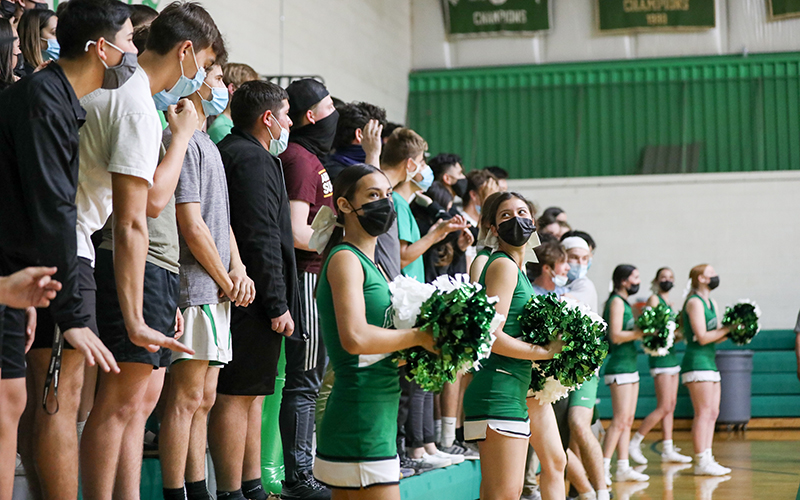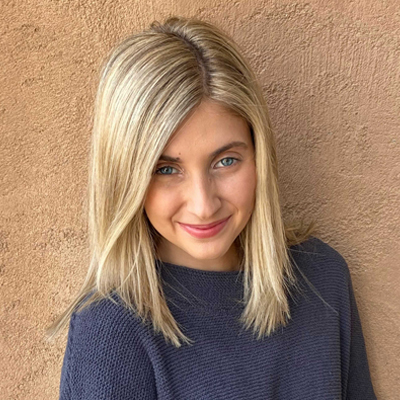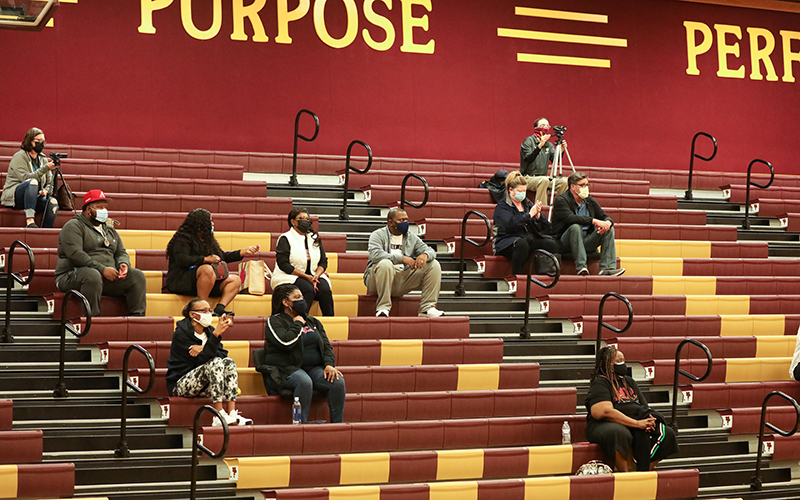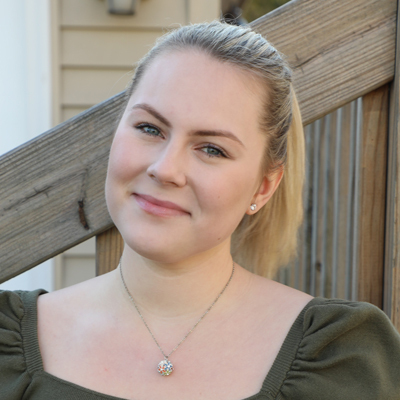
COVID-19 protocols were in place at a recent St. Mary’s game against Mountain Pointe. The AIA will be discussing plays for the spring sports season Tuesday. (Photo by Alina Nelson/Cronkite News)
PHOENIX – Winter high school sports, which are beginning to wrap up around Arizona, took on a much different look than in past years on and off the courts and playing fields.
Athletes had to jump through more hoops than they shot at. But at least the games have gone on.
Now with spring sports beginning today and the winter season ending Friday, the Arizona Interscholastic Association has scheduled a special meeting of its executive board at 9 a.m. Tuesday to discuss modifications. It will be streamed on AZPreps365 YouTube channel.
After initially suspending winter sports, the AIA, which regulates high school sports in the state, reversed its own ruling in early January and allowed athletes to play – with conditions.
Athletes and coaches are required to wear masks – even while competing. Attendance is limited. Teams have even had to change their travel arrangements, all because of the COVID-19 pandemic.
The spring season could mean more adjustments for thousands of Arizona high school athletes, their coaches and administrators. It’s something they’ve already grown accustomed to in 2021.
Just ask Xavier College Prep basketball coach Jennifer Gillom.
“My team is a very up-tempo team. We rely a lot on our defense and we press a lot,” Gillom said. “It’s hard to breathe with these masks on.”
For Xavier freshman Dominique Nesland, the only way to adjust to playing in a mask was to get used to wearing one as often as possible.
“On Saturdays and Sundays I usually work out with my dad at our gym, and I just started working out with the mask,” Nesland said.
But wearing masks alone was not enough to keep athletes safe.
“We had to limit things on the court,” Gillom said. “Only two people handling a ball at a time can do group work.”
Teams also had to adjust the way they travel to and from competitions in an effort to avoid contracting or spreading COVID-19, a prospect that could derail a season.
“A lot of schools are using school buses,” said Sister Lynn Winsor, vice principal of activities and athletics at Xavier. “Say you have freshman, JV, and varsity basketball. That could be up to 40 kids on the bus.”
The Gators adjusted to avoid packing that many athletes into the tight confines of a bus.
“One of the things that we are doing is our parents are driving our kids to the games,” Winsor said. “We have never done that before, at least in my history of working in interscholastic athletics.”
Another protocol set in place by the AIA is the mandatory COVID-19 athlete/coach-monitoring form, which must be completed by each team on game days. And there are other precautions being taken.
“We have these plastic partitions that we use at the attendance desk,” Winsor said. “We put those up on the scorer’s table so the people that are scoring, and when kids are up there checking in, they are protected. Between games our maintenance staff sprays them down.”
Just like professional sports, the AIA has set limits on fan attendance. Following the AIA’s approval in early January of winter sports, only parents of athletes playing for the home team were initially allowed to attend games.
That sparked a backlash from parents, and raised safety concerns after a Basha High School soccer player was injured in an away game while his parents watched a live stream of the match.
Like its athletes, the AIA adjusted and decided to allow parents to attend home and road competitions. The organization relaxed the protocols even more in mid-February, allowing schools to determine the number of fans permitted to attend their games.
While all of the new protocols are inconvenient, those involved in high school sports consider them a small sacrifice to make in order to provide student athletes the ability to play basketball and other sports this winter.
“I think all of us love the fact that we have sports,” Winsor said. “Parents love it, the kids love it, and the coaches love it. Activities are the other half of education.”


